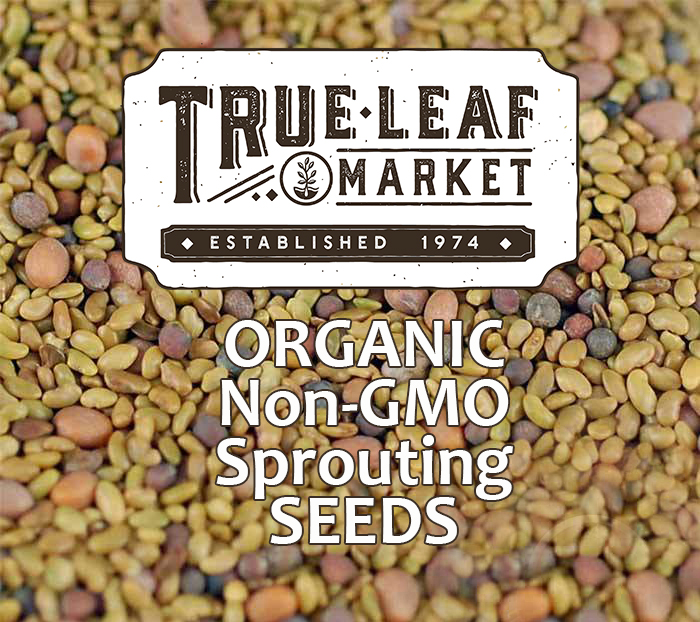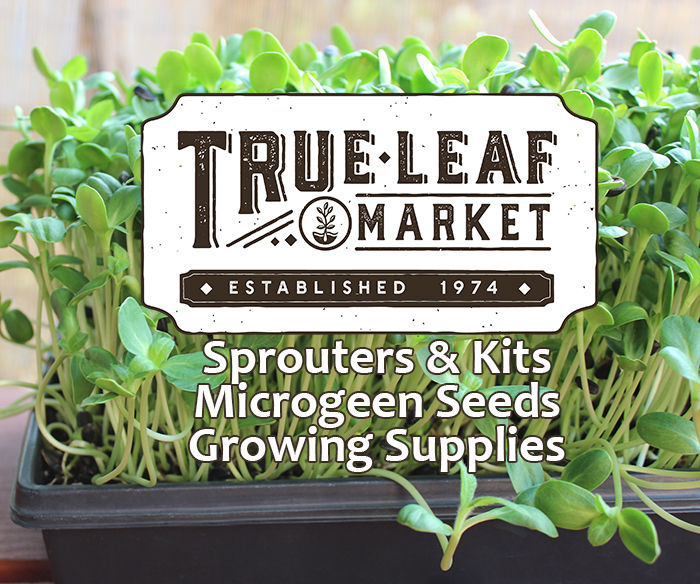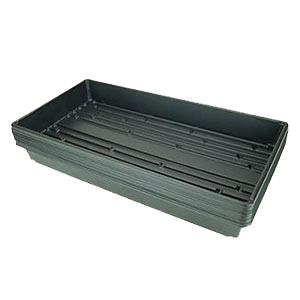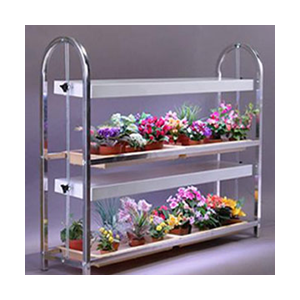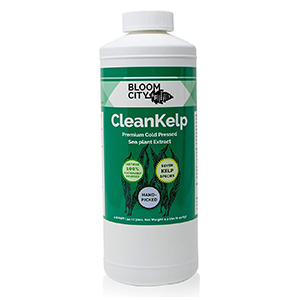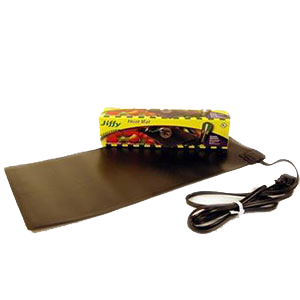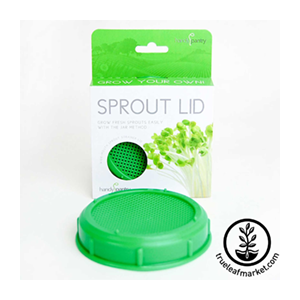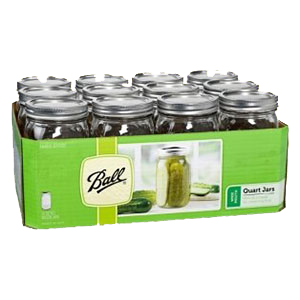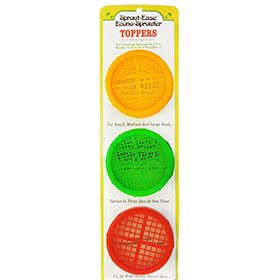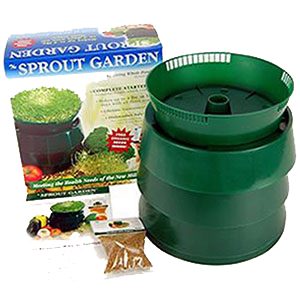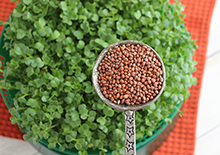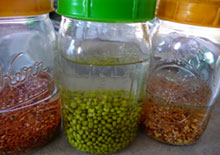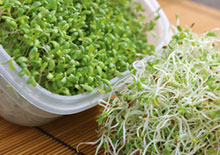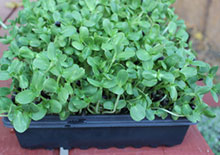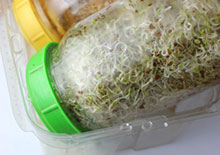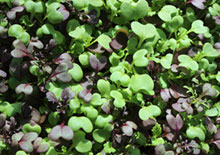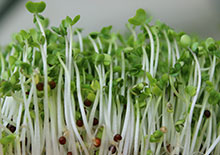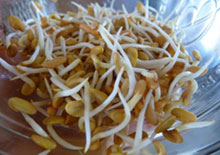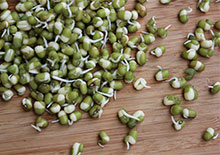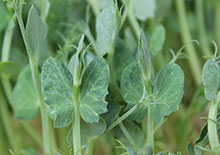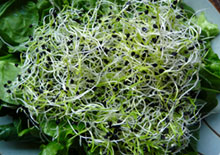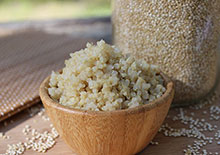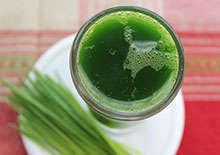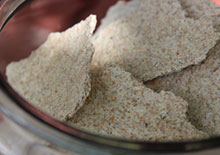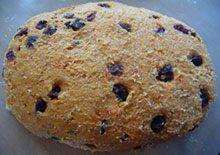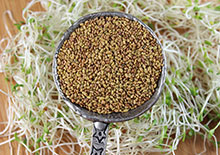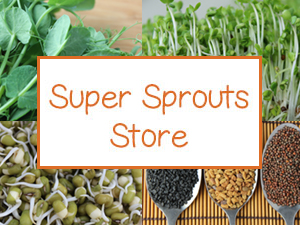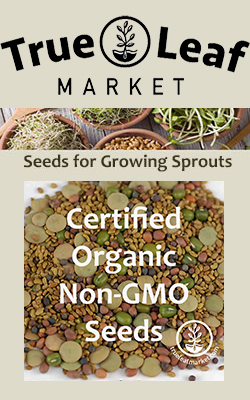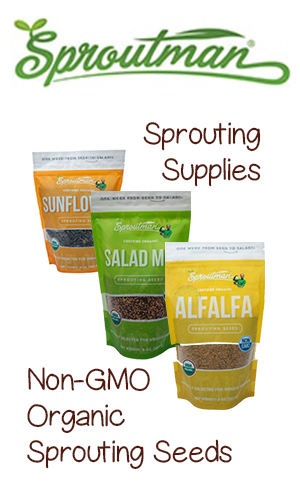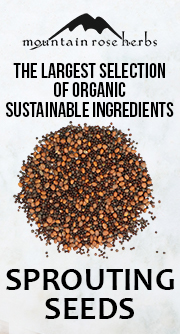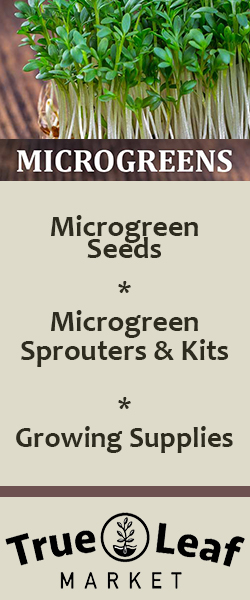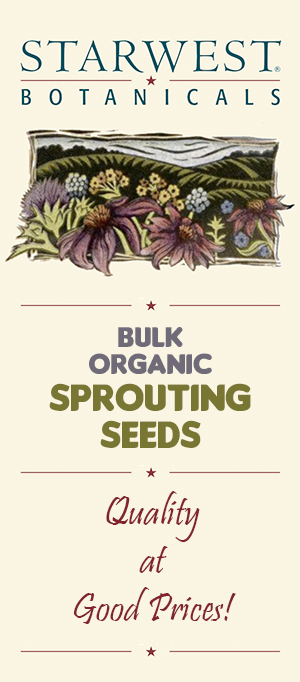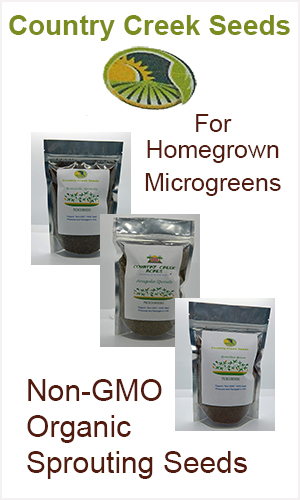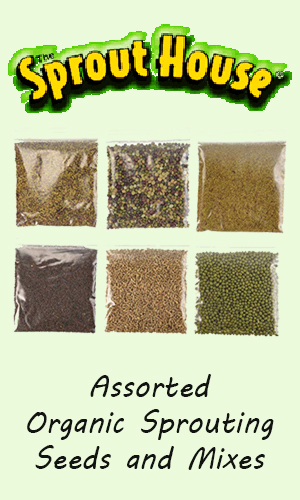- Home
- Super Sprouts
- Sprouting Guide
Sprouting Guide for Measuring Your Sprout Seeds
Intro | How to Make Sprouts | Purchasing Seeds | Sprouting Guide | Things to Consider | Where to Buy Seeds | Precautions | Shop
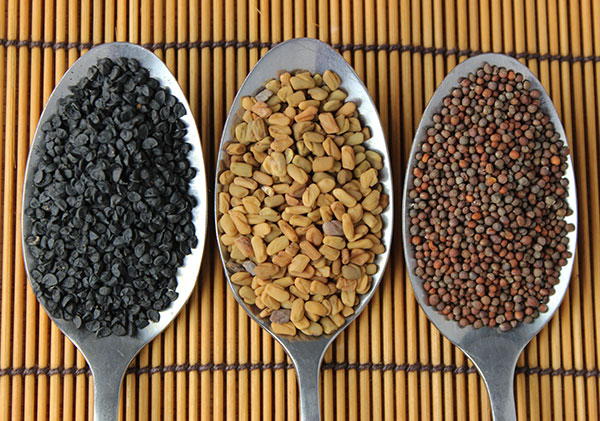
A sprouting guide can be a very helpful resource for those of you just learning how to grow sprouts at home. This is a listing of specific seed varieties along with the exact measurements required for creating sprouts using either jars, bags, mats, sprouters or trays.
One of the best parts about sprouting is that it generally takes a very small amount of seeds to grow a relatively large amount of sprouts. The yield of course varies depending on the sprouting method and seed type. Some seeds are limited to the containers they are grown in, while others are unconstrained, growing tall and vertical.
Table of Contents
Intro | How to Make Sprouts | Purchasing Seeds | Sprouting Guide | Things to Consider | Where to Buy Seeds | Precautions | Shop
Sprouting seeds for homemade sprouts is an inexpensive and simple way to grow your own food and doesn't require a large outdoor or indoor space.
All sprouts listed below can be grown indoors on a kitchen counter-top or table. We have even grown jar sprouts on the dash of our vehicle when traveling. Most thrive in climates above 65-70° F (18-21° C) and only require a little bit of attention once or twice a day for rinsing or watering.
How to Make Sprouts
Sprouts can be grown any number of ways. The three most basic techniques utilize either a glass jar with a mesh lid, a mat (also called a "blanket") or a sprouting bag. The next, slightly more advanced method is using a sprouting tray or a "sprouter." These are trays specifically designed for growing sprouts with holes on the bottom for soaking and draining the water when rinsing.
The other way to grow sprouts, especially the tall leafier versions or microgreens is to use a tray with either a soil medium, coconut coir or vermiculite. The latter two are soil-less mediums that can be used along with a liquid nutrient solution.
Purchasing Quality Sprouting Seeds
We strongly advise that you always purchase non-bleached, organically grown non-GMO seeds for sprouting purposes. Although they are sometimes slightly more price-wise, they are the only seeds we ever recommend using for growing sprouts.
All sprout seeds are not created equal. Some of the conventionally cultivated plants they are sourced from are grown in livestock manure, which can contaminate the seed and transfer harmful pathogenic organisms onto the sprouts.
According to the Organic Farming Research Foundation, "Organic standards set strict guidelines on manure use in organic farming: either it must be first composted, or it must be applied at least 90 days before harvest, which allows ample time for microbial breakdown of pathogens." (Source)
For more information on this subject see our Sprouts and Food Safety Controversy page.
Bulk Seeds and Storage
It is best, if you decide to become an avid sprout grower, to purchase your seeds in 1lb bag quantities. This is far more cost effective than buying seeds from bulk bins at your local health food store or buying tiny seed packets. Sealed bulk bags are usually fresher and more viable.
Sprout seeds should be stored in airtight glass jars or containers once the bag is opened and will usually last a few years when stored in a dark, cool dry environment.
(Visit our Super Sprout Store for our recommended seed and sprouting supplies.)
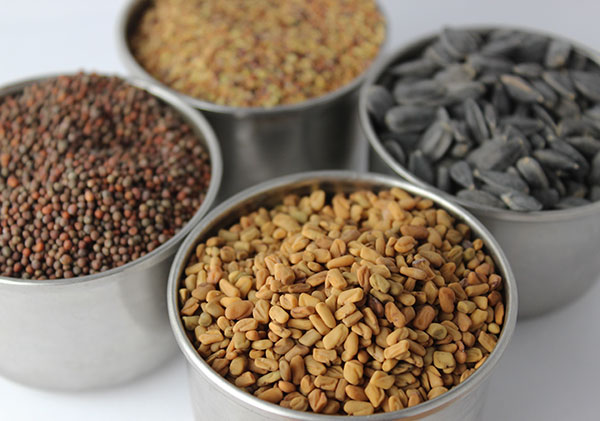
Sprouting Guide with Seed Measurements
Sprouting Guide Things to Consider:
- Seed Measurements - This is the amount of seeds to use per jar or tray and varies from seed to seed as they differ in size.
- Soaking Time - Most all sprouts, with the exception of a few, need to be soaked at least 8 hours in advance before the actual sprouting process can take place.
- Temperature - This is the range of degrees that also coincides with growing cycle of the plant the seed is sourced from. For example, cool weather crops grow best in springtime climates while summer crops do best with warmer temperatures.
- Sprouting Time - This is how long the seed takes to sprout from start to finish, after the seeds are soaked. This may differ depending on the seed variety as some take longer than others. How long it takes from "seed to sprout green" is, of course, contingent on one's own personal preferences.
Alfalfa Sprouts
- Seeds: 1 ½T alfalfa seeds (per quart jar or small 8"x8" round sprouting tray)
- Soak Time: 8 hours
- Temperature: 60-85° F (15-29° C)
- Sprouting time: 3-7 days
Basil Greens
- Seeds: 1 ½t basil seeds (per 20"x10" tray)
- Soak Time: 8 hours
- Temperature: 75-90° F (24-32° C)
- Sprouting time: 10-14 days
Broccoli Sprouts
- Seeds: 2T broccoli seeds (per quart jar or small 8"x8" round sprouting tray)
- Soak Time: 8 hours
- Temperature: 50-75° F (10-24° C)
- Sprouting time: 3-6 days
Buckwheat Greens
- Seeds: 1 ½C black unhulled buckwheat groats (per 20"x10" tray)
- Soak Time: 10 hours
- Temperature: 65-80° F (18-26° C)
- Sprouting time: 7-10 days
Clover Sprouts
- Seeds: 1 ½ T clover seeds (per quart jar or small 8"x8" round sprouting tray)
- Soak Time: 8 hours
- Temperature: 60-85° F (15-29° C)
- Sprouting time: 3-6 days
Cress Sprouts
- Seeds: 2T cress seeds (per quart jar or small 8"x8" round sprouting tray)
- No soaking required.
- Temperature: 60-85° F (15-29° C)
- Sprouting time: 5-14 days
Fenugreek Sprouts
- Seeds: 3T fenugreek seeds (per quart jar or small 8"x8" round sprouting tray to grow "methi")
- Soaking time: 10 hours
- Temperature: 65-85° F (18-29° C)
- Sprouting time: 3-14 days
Lentil Sprouts
- Seeds: 3/4C lentils (per quart jar)
- Soaking time: 8 hours
- Temperature: 60-85° F (15-29° C)
- Sprouting time: 2-3 days
Mung Sprouts
- Seeds: 1C mung beans (per quart jar)
- Soaking time: 12 hours
- Temperature: 68-85° F (20-29° C)
- Sprouting time: 2-5 days
Onion Sprouts
- Seeds: 4T black onion seeds (per quart jar or small 8"x8" round sprouting tray)
- Soaking time: 12 hours
- Temperature: 50-75° F (10-24° C)
- Sprouting time: 10-14 days
Pea Shoots
- Seeds: 2 ½C of green pea seeds (per 20"x10" tray) - initially germinate in two quart jars
- Soaking time: 12 hours
- Temperature: 50-75° F (10-24° C)
- Sprouting time: 10-14 days
Purslane Greens
- Seeds: 1 ½t purslane seeds (per 20"x10" tray)
- Soak Time: 10 hours
- Temperature: 65-85° F (18-29° C)
- Sprouting time: 10-14 days
Radish Sprouts (Red or Daikon)
- Seeds: 3T radish seeds (per quart jar or small 8"x8" round sprouting tray)
- Soaking time: 12 hours
- Temperature: 60-85° F (15-29° C)
- Sprouting time: 4-10 days
Sprouted Rye
- Seeds: 1C rye grain (per quart jar)
- Soaking time: 12 hours
- Temperature: 68-85° F (20-29° C)
- Sprouting time: 1-3 days
Sunflower Sprouts or Greens
- Seeds: 2C black oil unhulled sunflower seeds (per 20"x10" tray) - initially germinate in two quart jars
- Soaking time: 12 hours
- Temperature: 60-80° F (15-26° C)
- Sprouting time: 8-12 days
Sprouted Quinoa
- Seeds: 1C quinoa grain (per quart jar)
- Soaking time: 1 hour
- Temperature: 68-90° F (20-32° C)
- Sprouting time: 1-3 days
Sprouted Wheatberries
- Seeds: 1C wheatberries (per quart jar)
- Soaking time: 12 hours
- Temperature: 68-85° F (20-29° C)
- Sprouting time: 1-3 days
Wheatgrass
- Seeds: 2C wheatberries (per 20"x10" tray) - initially germinate in two quart jars
- Soaking time: 12 hours
- Temperature: 68-85° F (20-29° C)
- Sprouting time: 8-12 days

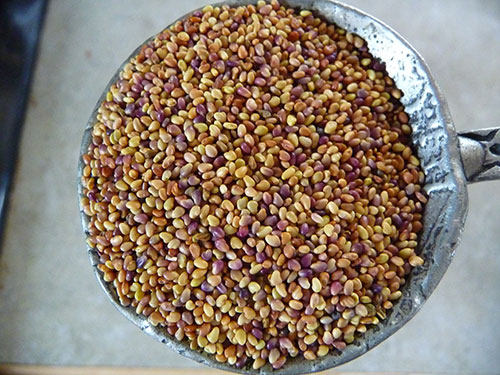
Where to Buy Sprouting Seeds
Use this link to buy the best quality seeds at some of the lowest prices available. These seeds are quality tested for germination rate, purity and pathogens. To ensure freshness and viability, we always buy seeds in 1 pound sealed bags.
Bags of seed are easy to store, don't take up much space, are an excellent survival food, next to wild edible greens, and can supply pounds of fresh living produce for pennies on the dollar.
Precautions:
When sprouts are grown inappropriately they can be contaminated with mold, which is especially detrimental to those with mold allergies. When growing sprouts at home it is important to purchase your seeds from an organically grown source who also test for potential pathogens as a precautionary measure to guard against potential Salmonella and E. coli contamination.
Shop Related Products (About Affiliates & Amazon Associate Paid Links)
Affiliate Disclaimer: This section contains affiliate product links. If you make a purchase through our recommended links, we receive a small commission at no additional cost to you. Thanks for the support.

